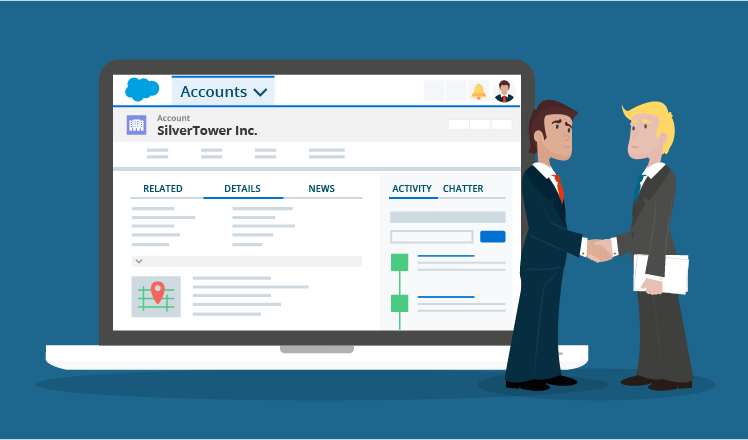Salesforce account management: Best practices for effective customer communication
Editor's note: In the article, we cover one aspect of effective sales - account management. We also offer to you professional customer relationship management services if you want to raise the efficiency of your communication with customers at all stages.
If your company has been on the market for more than a couple of years, high are the chances that you have a large business network. With a plethora of business contacts, you’ve probably noticed how difficult it becomes to track and manage all your accounts and customer communications. Fortunately, with Salesforce account and contact management, you can gather all data about your clients as well as store all important interactions and customer service cases in one place. This way, you can bring your dialogue with customers to a new level and significantly ease your sales process.
Below, we’ve summed up our best practices for establishing effective customer communication using Salesforce account tab. This information will prevent you from searching for critical customer information all over Salesforce accounts. Read on to discover how to use accounts to track and manage companies.

What is an account in Salesforce?
In Salesforce, an account is a company that you are or were doing business with. Salesforce account types allow you to store data not only about your clients and partners, but also about competitors, investors, resellers and all other parties that you may interact with in your work process. For example, if you are a software company that uses value-added resellers (VARs) to sell and service your products, you may want to select Reseller as one of your drop-down list values.
Note: Salesforce allows you to store and display different information sets based on the chosen account type (e.g., if you have a large distribution network, you may wish to have additional account fields to capture demographic and order information of various distributors). Depending on your preferences, Salesforce consultants can help you assign a different page layout for each of your account type values.
Creating a full profile for efficient Salesforce account management
Salesforce account object allows you to store the following data points:
- Company name
- Industry
- Size (the number of employees)
- Company billing and shipping address
- Phone number
- Website
- Account Owner
Besides, each Salesforce account record is supported by information from other tabs (contacts, opportunities, cases, activities, etc.) so that you can not only take a quick view from the top, but also easily drill down into the details. Collectively, all these data sets give you a complete view of your customer or any other account type you’ve created in Salesforce.
Now, let’s dive a bit deeper into Salesforce account management functionality.
How new accounts appear in Salesforce
The rule of thumb in Salesforce account-based marketing strategy is to create an account when:
- You convert a lead and create an opportunity. In this case, a lead will become a contact whereas an account will represent the company the lead works for.
Note: We’ve prepared a guide to opportunity management in Salesforce and a couple of lead management tips to navigate you in this process.
- You import a list of accounts and/or contacts from a data provider.
- You manually add an account after an outbound marketing or sales activity, such as a call, an email, or a meeting at a tradeshow.
Why specify parent-child relationships in Salesforce accounts
If you deal with large companies, you’ll likely need to organize data about their numerous divisions, business units and subsidiaries in a hierarchical way. Using a parent account in Salesforce, you can identify the company with the most influence or control and link it together with its multiple ‘child’ offices. This way, you can better understand your overall relationship with the whole business group, gain a wider perspective on the relationships within the unit as well as use collective monitoring to find new sales opportunities.
Why use account related lists
While an account record itself is helpful in finding all essential data about a company, account related lists are an absolute must-have when it comes to capturing critically important activities and interactions within a particular account. For example, a list of cases may be of great help for sales reps to stay informed of customer service issues and quickly resolve them.
You can also use a list of opportunities to complete the following tasks:
- Estimate the progress of each account by tracking all open and closed opportunities.
- Assess the opportunity progress, amount and close date of the opportunity within a particular account.
- Add new opportunities and link them automatically to an account.
- Edit and delete current opportunity records.
How to ensure an accurate Salesforce account database
The more you use Salesforce for account management, the harder it becomes to maintain your account database up-to-date. To get relevant and useful data for your accounts, you can turn to Lightning Data, a collection of trusted third-party data apps, available on the AppExchange. Using Lightning data solutions, sales reps can increase their productivity, having the info about new accounts automatically filled in and checked for quality.
Note: Consult our recent article about updates of customer profiles to get more ideas how to ensure an accurate account database.
When it makes sense to enable person accounts in Salesforce
If your company sells primarily to individual customers (online shoppers, gym members, vacation travelers, etc.), you may wish to use person accounts instead of or along with business accounts.
Before enabling person accounts, be aware that they have a number of peculiarities. For example, a person account record stores the information you’d typically save for a business contact rather than an account (for example, first name and last name). Besides, you can invite a person account to a meeting or associate it with a campaign, which is unavailable for a business account. That is why if you decided to use person accounts, we advise you to check up a person account behavior guide beforehand to see the whole list of differences.
Summarizing Salesforce account benefits
With Salesforce, your account management will become significantly more convenient. Below, we recap those valuable things you can do with Salesforce accounts:
- Consolidate all target accounts in one place.
- Eliminate paper-based account management.
- Quickly create new accounts.
- Maintain account consistency.
- Easily describe a company’s hierarchy and relationships with its subsidiaries.
- Assign account owner and account teams for a more effective business communication.
- Track top accounts to prioritize sales and marketing activities on them, etc.
We hope that with this information you will improve Salesforce account management and facilitate communication with customers. If you still have any questions, you’re welcome to ask our Salesforce consultants.

